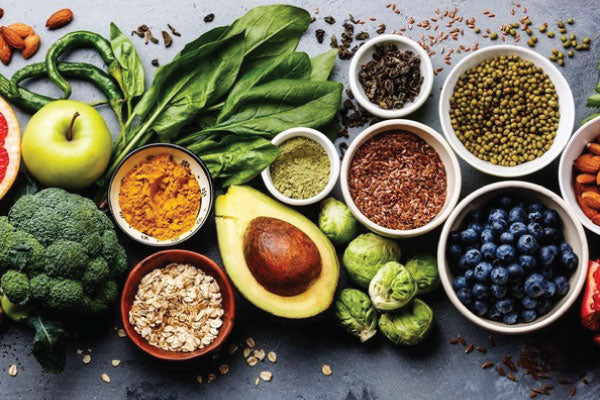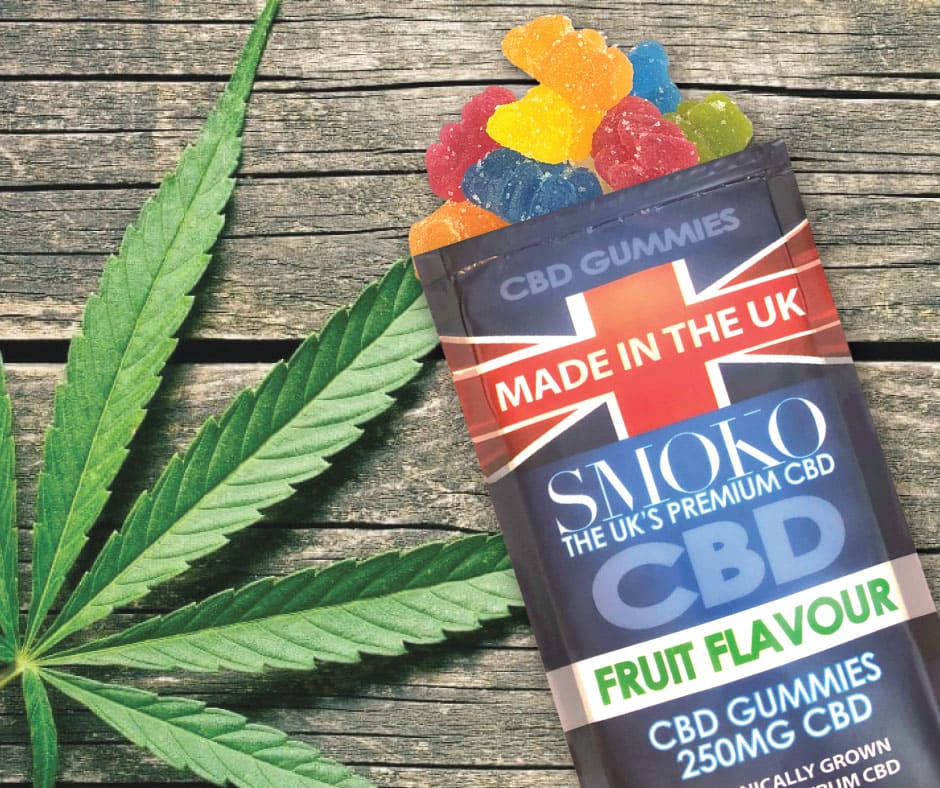Understanding Your Panic Response and CBD's Role
Think of your body's protective instincts as a highly sensitive emergency alarm. It’s designed to keep you safe from real threats. But what happens when that alarm starts blaring for no apparent reason? That’s the reality of a panic attack—a sudden, intense wave of fear that hijacks your body, making your heart pound, your chest tighten, and your mind race with worst-case scenarios.
What Happens During a Panic Attack?
During one of these episodes, a small, almond-shaped part of your brain called the amygdala—essentially your internal fear centre—mistakenly sounds the alarm. It triggers the "fight-or-flight" response, pumping your body full of adrenaline to prepare you for a danger that simply isn't there.
This is why someone telling you to "just relax" is often unhelpful. Your body isn’t just stressed; your nervous system has been taken over by a false alarm. Understanding that this is a powerful biological reaction, not a sign of weakness, is the first step toward managing it. It’s a survival instinct working overtime when it doesn’t need to.
How CBD May Help Regulate the Alarm System
This is where CBD for panic attacks becomes a point of interest. Instead of acting like a heavy sedative that just mutes the alarm, cannabidiol (CBD) seems to work more like a skilled technician, helping to recalibrate the faulty system. It interacts with your body's endocannabinoid system, a vast network that helps keep all your internal systems in balance, trying to achieve homeostasis.
By supporting this network, CBD may help soothe the overactive fear signals coming from the amygdala. This could potentially reduce both the intensity and frequency of panic episodes. You can learn more about the different ways CBD works with the body by reading about the potential health benefits of CBD.
Early scientific research gives us a visual idea of how CBD products might help quiet this neurological storm.
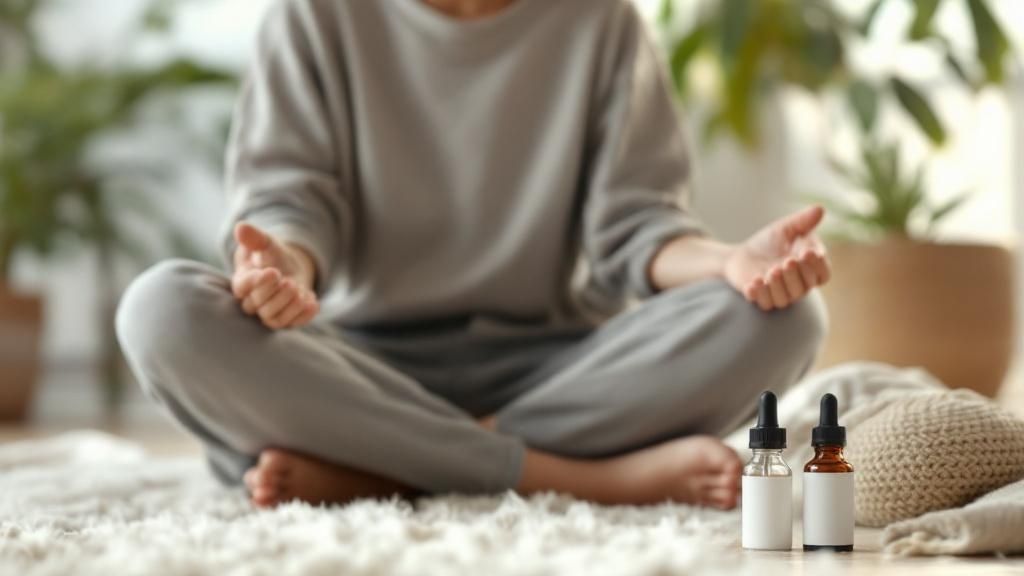
This neuroimaging suggests that CBD can influence blood flow to parts of the brain that are central to processing fear and anxiety, like the amygdala and hippocampus. By helping to adjust activity in these key areas, CBD may disrupt the feedback loop of panic before it can fully take hold, offering a clue to its calming effects.
This promising research is a key factor in the growing interest across the UK, where the CBD market is projected to reach £1 billion in 2025. Following this interest, formal clinical trials are now underway to properly test how well CBD works for anxiety disorders. While early studies showed it may reduce anxiety, these new trials will give us solid data from controlled human settings, clarifying its role as a supportive option. You can explore an evidence-based overview of CBD for anxiety to see the latest findings.
Ultimately, understanding your personal panic patterns is vital before trying any new approach. CBD isn’t a one-size-fits-all solution, but it is a potential tool that may help bring calm to an overactive nervous system. This, in turn, can give you the clarity and space to put other essential coping strategies into practice.
How CBD Actually Calms Your Nervous System
To grasp how CBD for panic attacks might work, imagine your body has an internal control panel called the endocannabinoid system (ECS). Its main job is to keep everything in balance, from your mood to your immune response. When a panic attack happens, it's like a major system alert goes off, throwing everything into high gear. CBD doesn't just hit the mute button on the alarm; it works to recalibrate the control panel itself.
Instead of forcing a specific chemical reaction, CBD acts more like a helpful guide. It encourages your body's natural systems to operate more efficiently. This indirect approach is why many people find it provides a sense of calm that feels sustainable, rather than just temporarily masking the symptoms.
The Serotonin Connection
One of the most important ways CBD may help is by interacting with your serotonin receptors, specifically the 5-HT1A receptor. This is the same receptor targeted by many common anti-anxiety medications. Think of serotonin as your brain's "feel-good" messenger.
CBD doesn't create more serotonin, but by interacting with these receptors, it may help your brain use the serotonin it already has more effectively. This is less about a sudden rush of happiness and more about fine-tuning the system that regulates your mood, potentially reducing the baseline anxiety that can trigger a panic attack.
Boosting Your Natural 'Calm Down' Chemicals
CBD also influences your GABA neurotransmitters, which are your nervous system’s primary "brake pedal." When you're feeling anxious or panicked, it’s like your brain's accelerator is stuck down. GABA’s job is to apply the brakes and slow things down.
Again, CBD doesn't produce more GABA. Instead, it seems to enhance the calming effect of your existing GABA, making your body's own braking system more powerful and responsive. This helps quiet the excessive brain activity that characterises anxiety and panic.
CBD's Three-Pronged Approach to Calm
To see how these pieces fit together, let's break down CBD's key actions in a simple table. It shows that CBD doesn't just do one thing, but works across different systems to help restore your body's natural balance.
|
Body System |
CBD's Effect |
Impact on Panic Symptoms |
|---|---|---|
|
Endocannabinoid System (ECS) |
Acts as a modulator to encourage homeostasis (balance). |
Helps regulate the body's overall stress response, preventing the nervous system from getting stuck in "panic mode." |
|
Serotonin System |
Interacts with 5-HT1A receptors. |
May improve how the brain uses serotonin, leading to a more stable emotional state and less underlying anxiety. |
|
GABAergic System |
Appears to enhance the effect of GABA neurotransmitters. |
Strengthens the "braking" signal in the brain, helping to reduce the neuronal over-excitement that fuels panic. |
As you can see, CBD takes a multi-faceted approach. It’s not about overpowering a single symptom but supporting the complex internal networks that keep you feeling balanced and in control.
The infographic below helps visualise how these interactions work together to create a path toward relief.
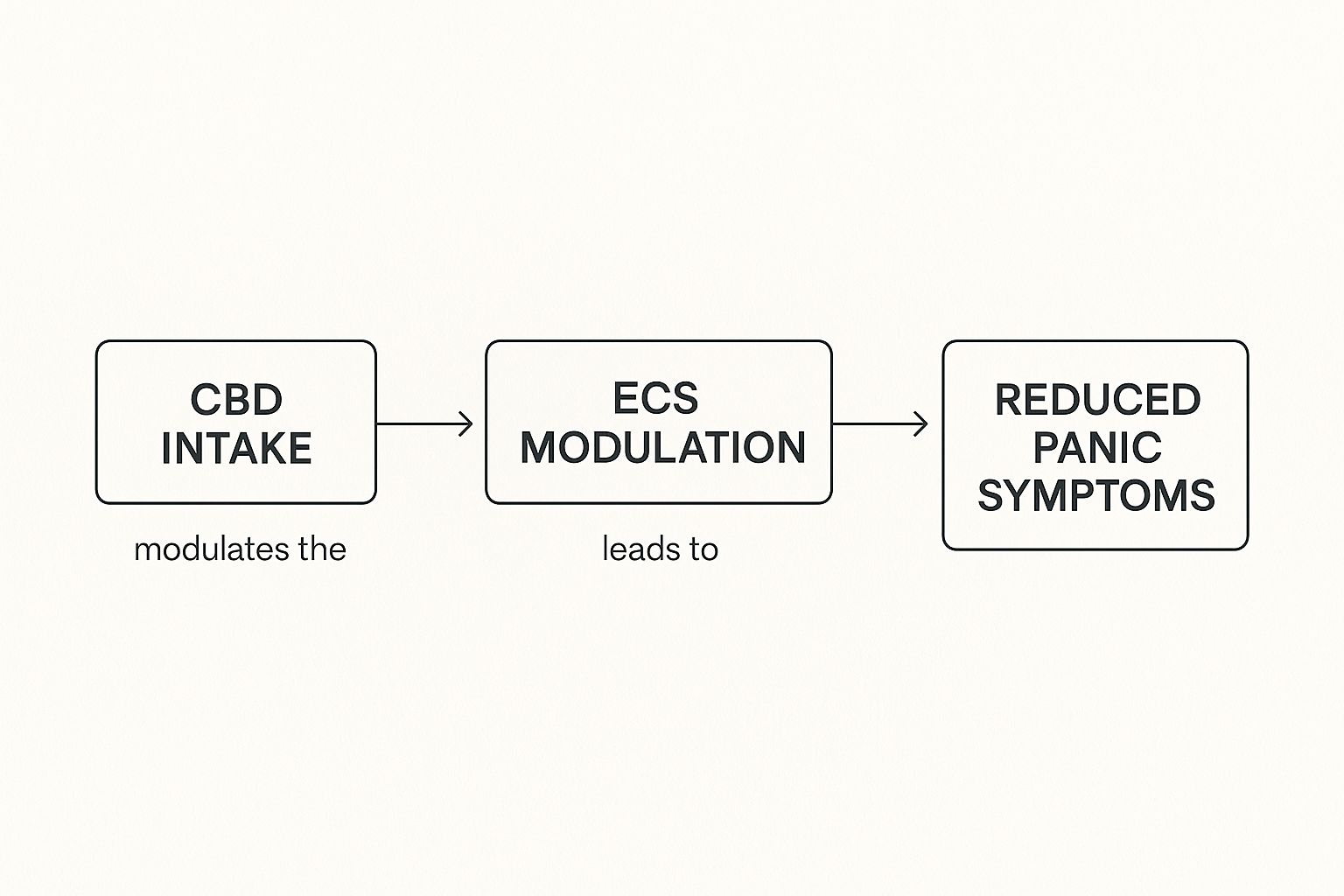
It highlights that CBD's role is to influence your body's own systems, guiding them back to a state of equilibrium.
A Different Timeline for Relief
This supportive role means that CBD works on a different timeline than fast-acting medications like benzodiazepines. It doesn't provide an instant "off switch" for panic because it's not a sedative. Instead, it works on the underlying issues by supporting serotonin and GABA function.
By helping to correct the neurochemical imbalances that can make you more susceptible to panic, it offers a more foundational type of support. To learn more about this process, our guide on how CBD oil helps anxiety is a great resource. It's important to remember that consistent use is often key, as it gives your body the time it needs to re-establish its natural calm.
What Real Research Reveals About CBD for Panic Disorder
After exploring the theory of how CBD might help quiet an overactive nervous system, it’s time to ask the big question: Does it actually work? We can move past the what-ifs and dive into what scientific studies show about using CBD for panic attacks and similar anxiety conditions. While the research is still growing, it gives us a promising look at its potential.
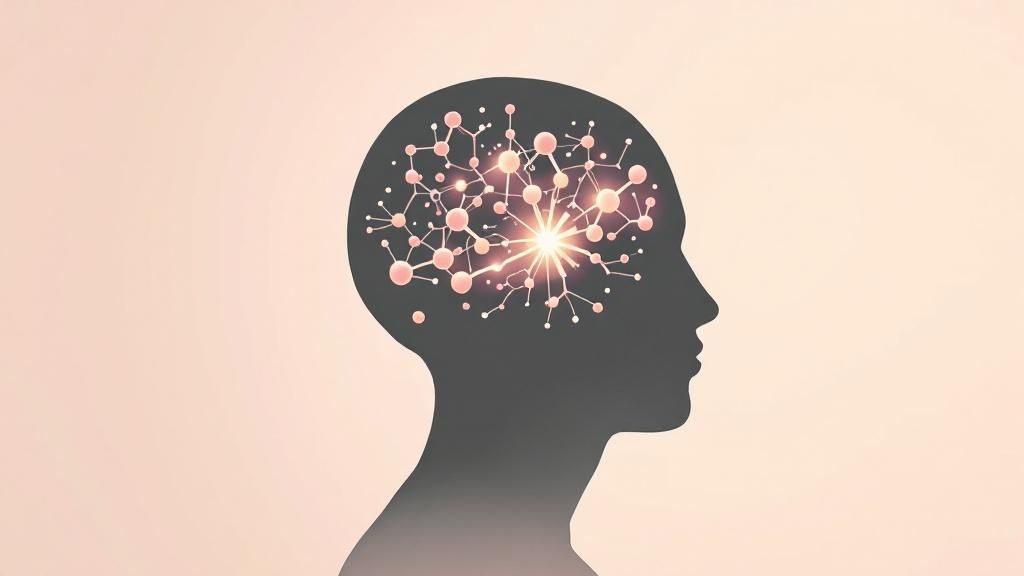
Putting CBD to the Test: Evidence from Human Trials
Some of the most compelling evidence comes from early human studies. One well-known CBD study put participants in a classic stress-inducing scenario: a simulated public speaking test. Those who received a dose of CBD before their "speech" reported feeling much less anxious and experienced less mental fog than the group that got a placebo. Importantly, they felt calmer without feeling drowsy or sedated.
In these controlled environments, researchers could measure the effects of specific doses. Many successful trials have used single doses between 300mg and 600mg, showing a clear drop in anxiety levels. This kind of research is critical because it provides a solid scientific foundation, moving the conversation from personal stories to measurable, objective results.
A Closer Look at the Research
To give you a clearer picture, let's look at a few key studies that have explored how CBD affects anxiety. The table below summarises the participants, dosages, and findings from major clinical trials.
Key Clinical Studies on CBD for Anxiety Disorders
Overview of major research studies examining CBD's effectiveness for panic and anxiety conditions
|
Study |
Participants |
CBD Dosage |
Duration |
Key Findings |
|---|---|---|---|---|
|
24 patients with Social Anxiety Disorder (SAD) |
600mg (single dose) |
1 day |
Significantly reduced anxiety, cognitive impairment, and discomfort during a simulated public speaking test. |
|
|
72 adults with primary concerns of anxiety or poor sleep |
25-175mg/day |
1 month |
Anxiety scores decreased in 79.2% of patients within the first month and remained low. |
|
|
37 Japanese teenagers with Social Anxiety Disorder |
300mg/day |
4 weeks |
CBD significantly reduced anxiety measured by standard clinical scales compared to the placebo group. |
These studies collectively suggest that CBD can reduce anxiety across different scenarios, from a one-time stressful event to ongoing daily struggles. However, they also show that the effective CBD dosage can vary quite a bit.
Keeping a Balanced View: What the Research Doesn't Tell Us Yet
It's important to look at these findings with a realistic perspective. While many results are positive, the field of CBD research is still in its early stages. Some studies have a small number of participants, and many have concentrated on social anxiety rather than specifically on panic disorder. Also, most trials have only looked at short-term effects, so more work is needed to understand the benefits of consistent, long-term use.
This hasn't slowed down public interest. In the UK, it's estimated that 30% of CBD users take it to manage anxiety. With a majority of Brits supporting its medical use, the demand for clear scientific answers is higher than ever. You can discover more about these CBD user trends to see how public perception is driving the conversation.
From Lab to Life: What Does This Mean for You?
So, what’s the main takeaway from all this research? The evidence provides a strong scientific reason to believe CBD can help with anxiety and panic. However, it also makes it clear that there's no magic formula that works for everyone. Your body chemistry, the intensity of your symptoms, and the kind of CBD product you choose will all influence your results. What works perfectly in a lab setting isn't a guarantee for every individual.
This reality underscores why it’s so important to get a handle on the fundamentals. You can get a solid overview from our comprehensive CBD FAQ page. Finding relief with CBD is a personal journey. The research gives us a hopeful map, but the next step is figuring out the right approach for you, starting with one of the most critical factors: dosage.
Finding Your Personal CBD Dosing Strategy
While research gives us a promising map, the journey to finding relief is a personal one. When you're using CBD for panic attacks, there isn't a single dose that works for everyone. It's a bit like tuning an old radio; you don't just turn the volume to maximum. You have to turn the dial slowly, listening carefully until the static clears and you hear the music. Your perfect dose is tied to your own body chemistry, weight, metabolism, and how severe your symptoms are.
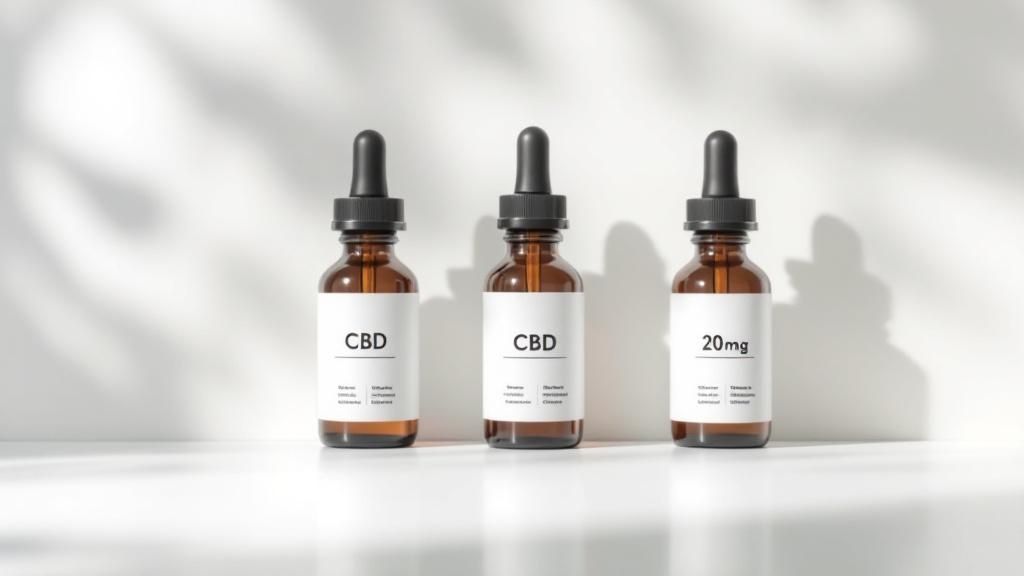
The 'Start Low and Go Slow' Approach
The most common advice you'll hear is to ‘start low and go slow’. This isn't just a cautious suggestion; it's a practical strategy that works with your body's endocannabinoid system (ECS). By starting with a small amount—say, 5mg to 10mg once or twice a day—you gently introduce CBD to your system without causing a shock. This gives your ECS time to adjust and respond effectively.
From there, you can slowly increase the amount every few days until you discover your personal ‘sweet spot’. This is the lowest dose that gives you the relief you're looking for. This careful process ensures you don't take more than you need and helps reduce any chance of side effects. It’s all about listening to what your body tells you, not just following a number.
Prevention vs. Acute Relief Dosing
Your dosing plan will also change depending on what you're trying to achieve. Are you looking to lower the number of panic attacks you have over time, or do you need immediate help when you feel one coming on?
-
Preventive Dosing: This means taking a regular, smaller dose of CBD each day, similar to a daily vitamin. The idea is to keep a consistent level of cannabinoids in your body, helping your ECS maintain balance and lower your baseline anxiety. Over time, this can make you less vulnerable to your usual panic triggers.
-
Acute Dosing: This approach is for those moments when you feel the first warning signs of a panic attack. It usually means taking a larger, faster-acting dose, like a few drops of CBD oil under your tongue. The goal is to get quick support to help calm the rising sense of panic.
How to Track Your Progress
Keeping a journal is one of the best ways to figure out what works for you. It takes the guesswork out of the process and gives you clear data to work with. By logging your experiences, you can spot patterns and make smart changes to your CBD routine. Even a simple log can be a game-changer.
|
Date |
Time of Day |
CBD Dose (mg) |
Symptoms Before Dose (1-10) |
Symptoms After 1 Hour (1-10) |
Notes & Triggers |
|---|---|---|---|---|---|
|
|
|
|
|
|
|
Remember to be patient with yourself and the process. If you're using a preventive strategy, it could take a few weeks before you see a real difference in how often you experience panic. This measured, personal method is the surest way to learn how CBD for panic attacks can become a helpful part of your wellness plan.
Choosing CBD Products That Actually Work for Panic Relief
Once you have a plan for finding your ideal dose, the next step is choosing a product that you can rely on. The UK market is full of options, but when you're using CBD for panic attacks, quality and consistency are everything. Not all products are the same, and picking the right one is essential for your safety and for getting the results you need.
How to Spot a Quality CBD Product
The most important tool for judging a product's quality is its Certificate of Analysis (CoA). Think of this as the product's passport. It's a report from an independent, third-party lab that verifies exactly what's inside the bottle. A trustworthy brand will always make this report easy to find - and you can check out the SMOKO CBD certificates of analysis here.
The CoA confirms the precise amount of CBD you're getting. More importantly, it ensures the product is free from THC, heavy metals, and pesticides.
After confirming a product is safe, think about which format fits your lifestyle and your approach to managing panic.
-
CBD Oils and Tinctures: These give you the most control over your dose, which is perfect for the "start low, go slow" method. When you place the oil under your tongue (sublingually), it absorbs relatively quickly. This can be a huge help for immediate support when you feel the first signs of a panic attack creeping in.
-
CBD Capsules and CBD Gummies: These deliver a perfectly measured dose every single time. This consistency makes them a great option for a daily preventative routine. The goal here is to lower your baseline anxiety over time, which may help make panic episodes less frequent and less intense.
Why the Type of CBD Matters for Anxiety
Beyond the format, the type of CBD extract used in the product is incredibly important. For anxiety, many people find broad-spectrum CBD to be especially helpful. This type of extract doesn't just contain CBD; it also includes other beneficial compounds from the hemp plant, like terpenes and minor cannabinoids, but with the THC completely removed.
Think of it like a symphony orchestra versus a solo violinist. While the violinist is great, the sound of all the instruments playing together is much richer and more powerful. This teamwork between the plant compounds is known as the entourage effect, and it may boost the overall calming benefits of the product.
This is where trusting your chosen brand is key. At SMOKO, we use broad-spectrum CBD sourced from organically grown hemp, and all our products are proudly made here in the UK. A well-rounded approach is often best, as other systems like your gut health are closely connected to your mental well-being. Learn more in our article about CBD for gut health.
Ultimately, choosing a high-quality, lab-verified product is the most critical first step to safely exploring how CBD can help with panic relief.
Safety First: CBD Interactions and Precautions
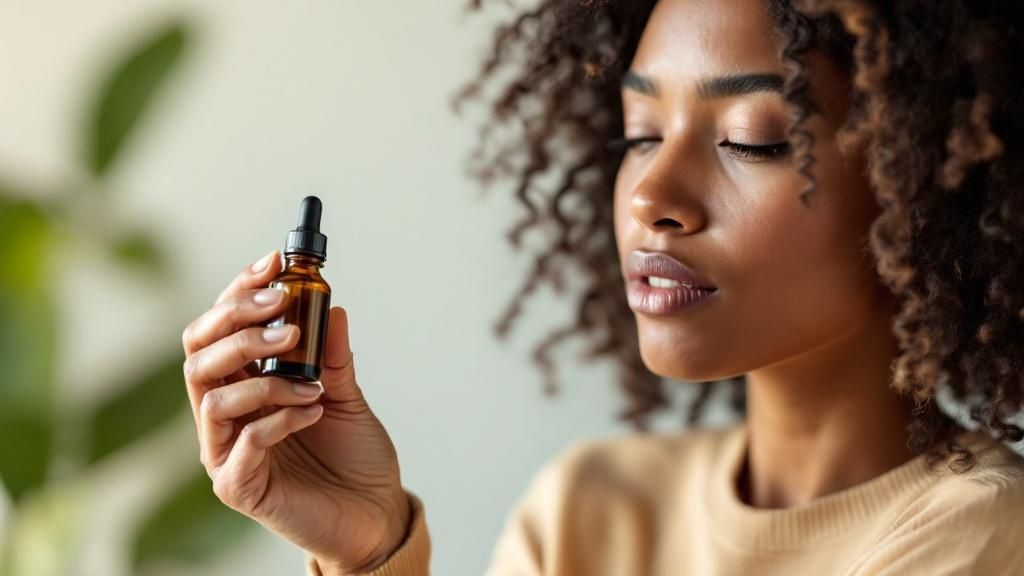
Using CBD safely is all about knowing your own body and understanding how this compound might interact with it. While CBD is generally seen as safe, a careful approach is key, especially if you're already navigating a condition like panic disorder. The goal here isn't to raise alarms, but to equip you with the knowledge to make confident and informed decisions.
How CBD Can Interact With Medications
One of the most critical safety points to consider is how CBD might affect prescription medications. You can think of it using the well-known "grapefruit juice effect." Both grapefruit and CBD can occupy the same family of enzymes in your liver that are responsible for breaking down many common drugs. When you take them together, they essentially compete for the liver's attention, which can alter how your body processes your medication.
This is particularly important if you are taking medications for anxiety or related conditions, such as:
-
SSRIs (Selective Serotonin Reuptake Inhibitors)
-
Benzodiazepines
-
Beta-blockers
Changing how much of these drugs are in your system could make them less effective or, conversely, increase your risk of side effects. For this very reason, having an open chat with your doctor before you add CBD into your daily life is absolutely essential.
Potential Side Effects to Be Aware Of
Research shows that most people handle CBD without any issues, but some mild side effects have been noted. It’s a good idea to know what these are, as they typically pop up when the dose is too high. These can include:
-
Fatigue or drowsiness
-
Nausea
-
Irritability
-
Changes in appetite or weight
For most people, these issues fade away by simply taking a smaller dose. This is another great reason why the "start low and go slow" approach is so widely recommended. It helps you discover your own effective dose while keeping the chance of unwanted effects to a minimum.
Who Should Avoid CBD?
While CBD is safe for the majority of adults, certain groups should be extra cautious or avoid it completely. There simply isn't enough research to say it's safe for pregnant or breastfeeding individuals. Also, because the liver processes CBD, anyone with a known liver condition should consult a specialist first.
Your personal health story is unique, and a healthcare professional is your best guide for navigating these considerations. Discussing the use of CBD for panic attacks with your GP provides a crucial safety net, allowing you to explore its potential benefits with peace of mind.
Building Your Complete Panic Management Toolkit
While CBD can be a fantastic tool, managing panic effectively in the long run requires more than just a single solution. It's about building a complete toolkit. Think of CBD for panic attacks as a foundational piece—it doesn’t do all the work, but it can make using your other tools much easier. By helping to create a calmer state of mind, it gives you the breathing room needed to put other powerful techniques into practice.
Complementary Strategies for Lasting Relief
Imagine your anxiety is like a radio playing static at full blast. Using CBD can be like turning down that volume. It doesn't switch the radio off, but it lowers the noise enough for you to hear your own thoughts more clearly. This calmer state is the ideal time to work on skills that get to the heart of panic, building a stronger and more resilient defence against it.
Consider adding these proven strategies to your toolkit alongside CBD:
-
Cognitive Behavioural Therapy (CBT): This type of therapy is incredibly effective for anxiety. It helps you recognise, question, and ultimately change the thought patterns that trigger and worsen panic attacks. You can even get started with apps like MindShift CBT, which introduce these essential skills.
-
Mindful Breathing Exercises: When panic hits, your breathing often becomes fast and shallow, which only makes things worse. Learning deliberate, slow breathing exercises (like box breathing) can activate your body's natural relaxation response. This grounds you in the moment and helps you feel more in control.
-
Proactive Lifestyle Adjustments: Your daily routines are the bedrock of your mental well-being. Simple things like regular exercise, a nutritious diet, and getting enough quality sleep are non-negotiable. They support your nervous system and make you less susceptible to panic in the first place.
Creating Your Personalised Action Plan
There's no one-size-fits-all toolkit. Yours should be built around your specific needs. Start by getting to know your personal panic triggers and the very first signs that an attack might be starting. With this knowledge, you can create a clear action plan for different situations.
For instance, if you know a public speaking event is a trigger, your plan might involve taking a preventative CBD dose and running through some CBT exercises beforehand. In contrast, a plan for a sudden, unexpected attack might focus on immediately starting a breathing technique.
Remember, this is your journey, and what helps one day might need a tweak the next. This is why keeping a journal, as we mentioned earlier, is so valuable. It allows you to see patterns, understand what's effective, and adjust your approach as you go.
Finally, while self-help strategies are essential, they are most effective when they don't replace professional medical advice. Always chat with your GP or a mental health professional about your plans, including your use of CBD. They can help ensure your approach is safe and works in harmony with any other treatments. A comprehensive toolkit is your strongest asset, one that combines your own efforts with expert guidance for lasting well-being.
Your Roadmap to Getting Started With CBD for Panic Relief
So, you're ready to see if CBD can help with panic attacks. That's a great step forward. This guide turns all the information you've learned into a simple, practical plan. Think of this as a personal discovery process, not an instant solution. Patience and consistency will be your most important allies in finding real, lasting relief.
A Practical Guide to Your First Steps
To get started safely and effectively, here are a few practical things to do:
-
Find a High-Quality Product: Your first choice should be a broad-spectrum CBD oil from a reputable UK brand. Always look for third-party lab reports, often called a Certificate of Analysis (CoA). This report is your proof that the product has the right amount of CBD and is free from THC, so you can use it with confidence.
-
Start Low and Go Slow: There's no rush. Begin with a very small daily dose, around 5-10mg. Stick with this amount for several days to see how your body responds before you think about increasing it. This method helps you find the minimum dose that works for you.
-
Keep a Simple Journal: This is one of the most useful things you can do. Each day, note down your dose, the time you took it, and any shifts in your anxiety or panic symptoms. This log will become your personal map, showing you exactly how CBD is affecting you and helping you make smart adjustments.
-
Be Consistent: To manage underlying anxiety, taking CBD daily is crucial. It helps keep a steady level of cannabinoids in your system. Think of it like watering a plant; consistent care helps it thrive. Over time, this may make you less vulnerable to your usual panic triggers.
Setting Realistic Expectations
It’s important to remember that finding relief with CBD is a marathon, not a sprint. It’s unlikely you'll feel a massive difference after just one dose. For many people, it takes several weeks of consistent daily use to see a noticeable drop in the frequency or intensity of their panic attacks.
Try to celebrate the small wins, like feeling a bit more at ease in a situation that would normally cause stress. If you feel like progress is slow, look back at your journal and be patient with the process. Most importantly, if your symptoms get worse or if you have any concerning side effects, you should stop taking CBD and talk to your GP right away.
Ready to begin with a product that meets these quality standards? Take a look at SMOKO’s lab-tested, UK-made broad-spectrum CBD oils and gummies. They provide the quality and reliability you need to start your journey toward a calmer state of mind.





